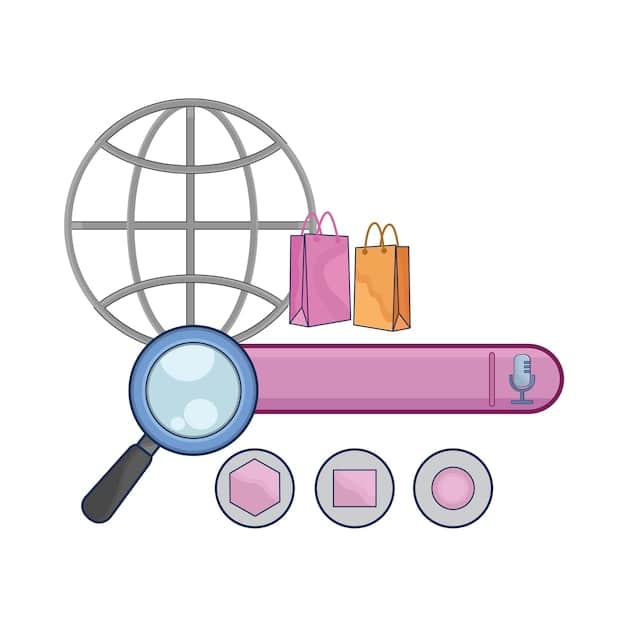Shopping Extension Data Privacy: 2025 Audit

Shopping extensions offer convenience, but their widespread use raises critical questions about data privacy and how your personal information is collected, used, and potentially sold in 2025, demanding a proactive privacy audit to safeguard your digital footprint.
In the digital age, browser extensions promise to streamline our online experience, especially when shopping. But as we embrace these tools, a critical question emerges: Is Your Shopping Extension Selling Your Data? A 2025 Privacy Audit reveals the complex landscape of how these convenient plugins interact with your personal information.
understanding browser shopping extensions
Browser shopping extensions have become ubiquitous, offering users instant coupon codes, price comparisons, and cashback opportunities. They are designed to enhance the online shopping experience, making it more efficient and cost-effective. However, their core functionality often requires extensive access to your browsing activity.
how shopping extensions work
These extensions typically integrate directly into your web browser, allowing them to monitor your activities on e-commerce sites. When you visit an online store, the extension springs into action, searching for relevant deals or providing price history. This real-time interaction is what makes them so appealing to consumers.
- Coupon Finders: Automatically apply available discount codes at checkout.
- Price Trackers: Monitor price fluctuations and alert you to drops.
- Cashback Services: Offer a percentage of your purchase back to you.
- Product Review Aggregators: Compile reviews from various sources.
The underlying mechanism involves injecting code into the web pages you visit, reading data from those pages, and sometimes even modifying their content. This level of access is necessary for their intended function, but it also creates a significant privacy challenge. Understanding this deep integration is the first step in assessing their data practices.
The convenience they offer is undeniable, but it comes at a potential cost. The data they collect can range from benign browsing history to highly sensitive purchasing patterns. This detailed information about your shopping habits, preferences, and even financial transactions becomes a valuable asset, not just for you, but potentially for the extension developers themselves and third parties they might partner with.
As we delve deeper into 2025, the sophistication of these extensions has evolved, as has the scrutiny over their data handling. Consumers are increasingly aware of their digital footprint, and the demand for transparency from software providers is growing. This section lays the groundwork for understanding exactly what these tools are and why their data practices are worth a close examination.
the data trail: what information do they collect?
The allure of saving money often overshadows the intricate data collection processes happening behind the scenes of your favorite shopping extensions. It’s crucial to understand precisely what kind of information these extensions are capable of collecting and how that data might be used.
Many extensions require broad permissions during installation, often requesting access to “read and change all your data on the websites you visit.” While this permission might be necessary for their core functionality, it also grants them a sweeping view of your online activities.
types of data commonly collected
The range of data that can be collected is extensive, moving beyond just your shopping history to encompass broader online behaviors. This makes the privacy implications significant, as a holistic profile of your digital life can be built.
- Browsing History: Which websites you visit, how long you stay, and your navigation patterns.
- Search Queries: The terms you type into search engines, revealing your interests and intentions.
- Shopping Habits: Products viewed, items in your cart, purchase history, and even specific brands you prefer.
- Personal Identifiable Information (PII): While extensions typically don’t directly ask for PII like your name or email, your browsing data can often be linked back to you, especially if you’re logged into various accounts.
- Device Information: Your IP address, operating system, and browser version, which can contribute to a unique digital fingerprint.
Beyond browsing, some extensions may also inadvertently, or intentionally, collect data from forms you fill out, including payment information (though typically not directly processed by the extension itself) or login credentials. The nuanced permissions often granted by users, sometimes without full comprehension, allow for this broad data capture.
The collection of this data isn’t always malicious, but it’s rarely solely for your benefit. Developers use this information to improve their services, yes, but also to build detailed user profiles. These profiles are incredibly valuable, whether for targeted advertising, market research, or, controversially, for sale to third parties. Identifying what is collected is the first practical step in auditing an extension’s privacy posture and deciding if the perceived benefits truly outweigh the potential privacy costs in an increasingly data-driven world.
data monetization: the selling of your digital footprint
The primary concern for many users is whether their shopping extension is selling their data. In most cases, if a service is “free,” it’s because you are the product. This often holds true for many browser extensions. Data monetization strategies are varied and sometimes opaque.

Extensions might not directly sell your personal name or credit card number. Instead, they often sell aggregated, anonymized, or pseudonymized data sets. However, even “anonymized” data can sometimes be re-identified, especially when combined with other data points available across the internet.
common data monetization models
Understanding these models helps shed light on the potential pathways your data might take once collected by an extension. These practices are often hidden within lengthy privacy policies that few users ever read.
- Targeted Advertising: Your browsing and shopping history are used to create a profile that allows advertisers to serve you highly personalized ads, both within the extension’s interface and across other websites.
- Data Brokerage: Extensions can sell aggregated (or sometimes even more granular) data to data brokers. These companies compile vast databases of consumer information and sell them to marketers, financial institutions, and other businesses.
- Market Research: Companies might purchase insights derived from shopping habits to understand consumer trends, product demand, and competitive landscapes.
- Traffic Referral Fees: While not a direct sale of data, some extensions earn commissions by directing users to specific retailers. This still leverages your browsing behavior to generate revenue.
The opacity of data sharing agreements is a significant challenge. Many privacy policies contain vague language that permits broad data sharing with “partners” or “affiliates.” This makes it incredibly difficult for the average user to know exactly who has access to their data and for what purposes.
A disturbing development in the data landscape is the rise of “data clean rooms” or secure data collaboration platforms, where companies can share and analyze data without directly revealing individual identities, yet still deriving commercial value from user behaviors. While presented as privacy-preserving, they still represent a sophisticated method of monetizing your digital footprint. As we move further into 2025, these methods are only becoming more refined, making the audit of what your extensions are truly doing even more critical.
red flags: identifying suspicious extension behavior
Staying vigilant about your online privacy means recognizing the warning signs that an extension might be overstepping its bounds. Not all extensions are malicious, but many engage in data practices that users would find uncomfortable if fully aware.
One of the clearest indicators is an extension requesting permissions that seem excessive for its stated purpose. A coupon extension, for example, shouldn’t need access to your camera or microphone, nor should it require “read and change all your data on websites” without a very clear and justifiable reason.
key warning signs
Being able to identify these red flags can empower you to make informed decisions about which extensions to trust and which to remove. Your browser’s extension management page is your first line of defense.
- Overly Broad Permissions: As mentioned, permissions that go beyond the extension’s core function are a major red flag. Always review requested permissions upon installation.
- Lack of Transparency: A vague or non-existent privacy policy is a serious concern. Reputable extensions should clearly outline what data they collect, why, and with whom they share it.
- Unusual Network Activity: Tools like network monitors can reveal if an extension is sending large amounts of data to unknown servers, especially when you’re not actively using its features.
- Sudden Performance Issues: A previously well-behaved browser suddenly slowing down, displaying unexpected ads, or redirecting to strange websites might indicate a compromised or poorly behaved extension.
- Negative User Reviews: While not always definitive, a pattern of user complaints about privacy violations, data selling, or intrusive behavior should be taken seriously.
Another subtle red flag can be the business model itself. If a comprehensive shopping extension is completely free with no clear path to revenue (e.g., no premium features, no stated referral fees), then data monetization is highly likely to be its core business. In 2025, the increased sophistication of phishing attacks and malicious code injection means that even seemingly legitimate extensions can be compromised or sold to bad actors. Regularly reviewing your installed extensions and their reported permissions is a proactive defense mechanism against potential data breaches or privacy infringements. Don’t assume all “free” tools are benign; question their underlying economic drivers.
conducting a 2025 privacy audit: step-by-step guide
Taking control of your digital privacy requires a proactive approach. A dedicated privacy audit of your browser extensions, especially shopping ones, should be a regular practice in 2025. This isn’t just about deleting suspicious extensions; it’s about understanding and minimizing your general online exposure.
This audit process should empower you to make informed decisions about the tools you use, balancing convenience with your personal privacy preferences. It’s a continuous process, as extension behaviors and privacy policies can change over time.
practical steps for an effective audit
These steps are designed to be actionable and straightforward, enabling even non-technical users to perform a thorough check of their browser’s security and privacy posture. Regular maintenance is key here.
- Review All Installed Extensions: Go to your browser’s extension management page (e.g., Chrome:
chrome://extensions; Firefox:about:addons). Scrutinize every extension. If you don’t recognize it or no longer use it, uninstall it immediately. - Examine Permissions: For each active extension, click on its details or settings to view its requested permissions. Ask yourself if these permissions are absolutely necessary for the extension’s function. If a coupon extension wants access to your camera, that’s a problem.
- Read Privacy Policies: While often lengthy, try to skim the privacy policy of each remaining extension. Look for sections on “data sharing,” “third parties,” or “monetization.” Search for specific terms like “sell,” “share,” or “aggregate.”
- Check User Reviews and Reputation: Search for the extension name online, particularly in privacy forums or tech review sites. A history of privacy concerns or security vulnerabilities should prompt immediate uninstallation.
- Limit Access Where Possible: Many browsers now allow you to limit an extension’s access to specific sites rather than “all sites.” If an extension only needs to work on shopping sites, restrict its access accordingly.
- Consider Alternatives: If a popular extension raises too many privacy concerns, research open-source or privacy-focused alternatives that offer similar functionality with better data practices.
 “Check Permissions” -> “Read Policies” -> “Seek Alternatives” -> “Regular Monitoring.”” class=”aligncenter size-large”/>
“Check Permissions” -> “Read Policies” -> “Seek Alternatives” -> “Regular Monitoring.”” class=”aligncenter size-large”/>
Remember that even highly-rated extensions can have concerning privacy practices if their business model relies on data monetization. Your goal is to minimize unnecessary data collection and sharing. By regularly performing this audit, you maintain a level of control over your digital identity, making 2025 a year where your data works for you, not against you.
privacy-centric alternatives and best practices
While the convenience of shopping extensions is tempting, a genuine concern for privacy might lead you to seek out alternatives or adopt best practices that minimize your digital footprint without abandoning online shopping entirely. In 2025, a range of tools and habits can help achieve this balance.
The core idea is to shift from automatic, pervasive data collection to more intentional data sharing. This might involve a slight increase in manual effort but offers significantly greater privacy assurances.
smarter shopping for enhanced privacy
- Use Privacy-Focused Browsers: Browsers like Brave, Firefox, or DuckDuckGo are built with privacy in mind, often blocking trackers and fingerprinting by default. While they may not have native shopping extension functionality, their core privacy features are robust.
- Incognito/Private Browsing Mode: For sensitive purchases or browsing, use incognito mode. While not a panacea for all privacy concerns, it prevents cookies and browsing history from being saved locally.
- Dedicated Shopping Browser Profile: Consider setting up a separate browser profile solely for online shopping. Install only essential, highly-vetted shopping extensions on this profile, minimizing their access to your general browsing habits.
- Manual Coupon Searching: Instead of relying on an extension, consider manually searching for coupon codes on trusted coupon sites just before checkout. This requires more effort but avoids constant browsing surveillance.
- Evaluate Cloud-Based Solutions: Some reputable companies offer price comparisons or deal alerts through web applications rather than browser extensions. While data is still processed, it’s often within a more transparent, server-side environment.
- Utilize Virtual Payment Cards: Services that offer virtual credit card numbers for online purchases add an extra layer of security, creating disposable card numbers that can be limited to a single transaction or merchant.
Looking ahead to 2025, the push for greater data privacy legislation and browser-level privacy controls is gaining momentum. Companies are also starting to respond to consumer demand for more transparent and ethical data practices. By combining the smart use of privacy-focused tools with disciplined online habits, users can significantly mitigate the risks associated with shopping extensions. It’s about being an educated consumer, not just of products, but of the digital services that facilitate those purchases. The goal is a secure and private online experience without sacrificing the convenience that the digital age offers.
the future of data privacy and shopping extensions in 2025
As we navigate further into 2025, the landscape of data privacy concerning shopping extensions is undergoing significant transformation. Consumer awareness is at an all-time high, driven by major data breaches and increasing media scrutiny, pushing regulatory bodies and tech companies to adapt. The future points towards a more regulated, but also more complex, environment for personal data.
We are seeing an acceleration in the development of technologies designed to enhance privacy, as well as a greater emphasis on user consent. This evolution suggests that the onus will increasingly be on extension developers to demonstrate clear and ethical data handling.
evolving landscape and challenges
- Stricter Regulations: Governments worldwide are implementing and enforcing more stringent data protection laws (beyond GDPR and CCPA), moving towards a global standard of user data rights. This could lead to more explicit requirements for extension developers regarding data collection and sharing.
- Browser-Level Protections: Major browser developers are continuously enhancing built-in privacy features, such as advanced tracking prevention, improved cookie controls, and more transparent permission management. This might limit the scope of data extensions can collect by default.
- Privacy-Enhancing Technologies (PETs): The adoption of technologies like federated learning, differential privacy, and homomorphic encryption could allow developers to gain insights from aggregated data without ever accessing individual user data in plain text, offering a potential middle ground.
- Decentralized Alternatives: The rise of decentralized web (Web3) technologies could lead to new models of online shopping where user data remains under the user’s direct control, challenging the traditional centralized data collection model of extensions.
- User Education and Empowerment: There’s a growing movement towards educating users about their digital rights and providing them with user-friendly tools to manage their privacy settings across various platforms. This empowered user base will drive demand for more private solutions.
However, challenges persist. The arms race between data collectors and privacy advocates continues. Sophisticated fingerprinting techniques and obscure data sharing agreements mean that staying private will still require vigilance. Furthermore, the economic incentives for data monetization remain powerful, ensuring that innovation in data collection will continue alongside innovation in data protection.
For shopping extensions, this means a bifurcated future: those that prioritize and transparently uphold user privacy will thrive as consumer trust becomes a premium, while those that continue with opaque or exploitative practices will face increasing regulatory pressure and user abandonment. The narrative of 2025 will be defined by an ongoing struggle for control over personal data, with users demanding that convenience no longer necessitates a complete surrender of privacy.
| Key Point | Brief Description |
|---|---|
| 🛍️ Data Collection Scope | Shopping extensions collect browsing history, search queries, and shopping habits, often requiring broad permissions. |
| 💸 Monetization Models | Monetization often involves selling aggregated data for targeted ads, data brokerage, and market research. |
| 🚨 Red Flagged Behaviors | Watch for excessive permissions, vague privacy policies, unusual network activity, and sudden browser issues. |
| 🛡️ Privacy Audit Steps | Regularly review installed extensions, check permissions, read policies, and seek user reviews for privacy concerns. |
frequently asked questions about shopping extensions and data privacy
▼
Not all, but many do, often as part of their business model, especially if they are free. They usually sell aggregated or anonymized browsing and shopping behavior data to third parties for advertising or market research. It’s crucial to read their privacy policies carefully to understand their data practices.
▼
The largest risks include extensive data collection (browsing history, purchase patterns), potential data sharing with numerous third parties, and the possibility of re-identifying “anonymized” data. Some extensions may also expose users to security vulnerabilities like malvertising or phishing attacks if compromised.
▼
In most browsers, you can simply go to your extensions management page (e.g., in Chrome, navigate to chrome://extensions, or Firefox about:addons). Click on the extension’s details or “More actions” to see its requested permissions. Review these carefully before enabling or trusting any extension.
▼
Yes, some alternatives focus on privacy by minimizing data collection or operating transparently. Consider using privacy-focused browsers, manually searching for coupons on dedicated sites, or setting up a separate browser profile for shopping with minimal, trusted extensions installed. Less data collection means better privacy.
▼
2025 is expected to bring stricter regulations globally, enhanced browser-level privacy controls, and greater adoption of privacy-enhancing technologies. Users will also become more educated and empowered to demand better data practices, potentially forcing less transparent extensions to adapt or face obsolescence.
conclusion
The convenience offered by shopping extensions is undeniable, yet the price for this ease often comes in the form of our valuable personal data. As our 2025 privacy audit has underscored, understanding “Is Your Shopping Extension Selling Your Data?” requires vigilance, informed decision-making, and proactive management of your digital tools. By regularly scrutinizing permissions, reviewing privacy policies, and opting for more privacy-centric alternatives, consumers can reclaim a significant degree of control over their online footprint. The future of digital shopping demands a balance between convenience and privacy, and with the right approach, it’s a balance we can achieve.





